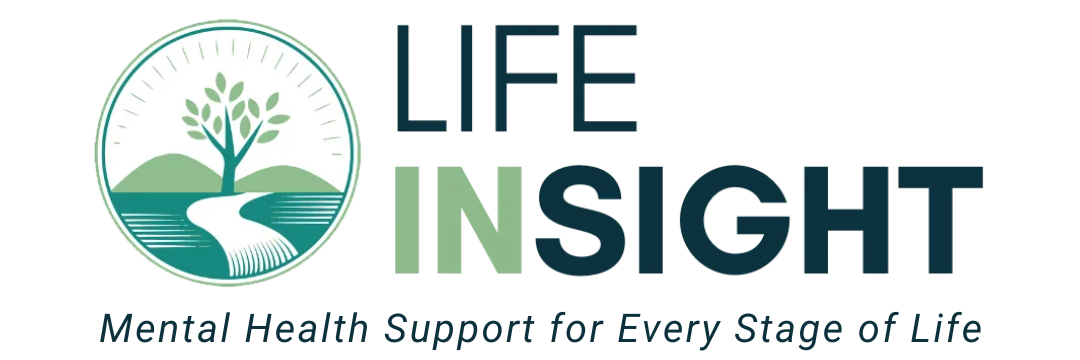Does My Child Need Therapy?
Sometimes, changes to your child’s or teen’s personality can leave you wondering whether he or she may be exhibiting signs of a natural development or symptoms of something more serious. Oftentimes, parents find themselves wondering, “How do you talk to your children about their mental health?” and “Do they need therapy?” In fact, many families who contact our center
begin by asking these same questions.
Christina Futterknecht, one of Life InSight’s therapists, can help shed some light on this area. Christina has worked closely with children and adolescents across settings – including home, school, and private office. She says, “It’s important to observe if a child’s challenges significantly impact their everyday life. Parents should focus on a few key factors, such as their behavior, emotions, learning and relationships with others. Their problems can also change how they typically cope with situations, leaving them more anxious or frustrated. Understanding how your child is affected may help guide what support they receive.”
According to Christina, some signs to pay attention to include:
- Excessive sadness or worry:
- One of the most sure-tell causes for concern includes emotions that seem to take over your child’s or teen’s thoughts and behaviors. If your child seems sad, hopeless, or disinterested in activities they once enjoyed for a prolonged period, it might indicate something deeper like depression or anxiety.
- Although it can be natural for children to be afraid of certain things, if your child is frequently fearful, anxious, or overly worried about things that don’t pose real danger, they may benefit from someone to talk to.
- It’s important to note that children sometimes express emotional distress through physical symptoms like stomachaches, headaches, or dizziness. If these are chronic, and no physical illness can be found, they could be related to anxiety or other emotional difficulties.
- Social withdrawal and isolation:
- Withdrawal from social interactions or family activities can also signal emotional struggles. Parents may begin to suspect something is wrong when their child eats alone at lunch, avoids social events, or appears reluctant to leave the home.
- Mood swings, irritability, or aggression:
- Frequent temper tantrums and outbursts that appear disproportionate to the stressor can be signs that your child is struggling with regulating their emotions or helpfully expressing their feelings.
- Changes in academic functioning:
- A sharp and unusual decline in academic performance can sometimes be linked to emotional or psychological issues.
If you notice any of these signs persisting for a while and affecting your child's daily life, it may be a good idea to reach out to a child therapist for an assessment. Early intervention can make a significant difference in helping children build resilience, develop coping skills, and heal from emotional or behavioral challenges.
Talking to your child or teen about mental health
Christina believes that when speaking to your children about mental health, “don’t be afraid to broach the topic – emphasize that mental health is just as important as our physical health”. She adds that it is important “to create a safe space for your child and let them know it is okay to speak with you about how they feel. When listening to your child, try to encourage open
communication and validate his or her feelings. Children might need time to open up, and that is okay. Give them the space and time to think about their feelings.” A patient and understanding stance can go a long way.
What does child therapy look like?
As kids mature and grow, so does their emotional and cognitive development. That’s why child therapy often looks different from adult therapy, and will vary depending on their age, needs, and temperament. According to Christina, the two most widely used approaches draw from Play Therapy and Cognitive Behavioral Therapy.
1. Play Therapy:
This is one of the most common approaches for younger children and allows youth to express themselves through play, art, games, and other creative methods. Since children might not have the vocabulary or maturity to articulate their feelings directly, play is a safe and natural way for them to work through and “talk about” their
issues.
2. Cognitive Behavioral Therapy (CBT):
CBT is a research-based, structured form of therapy that can be adapted for children and has been well validated to address concerns in anxiety, depression, or trauma. It focuses on identifying negative thought patterns and replacing them with healthier, more realistic ones. Because children have different cognitive and emotional processing compared to adults, CBT for kids tends to be more interactive, playful, and structured to match their developmental stage.
Taking the first step
If you’ve been wondering whether therapy could benefit your child, don’t hesitate to reach out. Life InSight’s team is here to support you and your family through every step of the process. Our experienced child therapists and psychologists specialize in working with children and adolescents, providing a safe and judgement-free environment for them to express their feelings
and build effective coping skills. We offer in-person mental health therapy in our Bergen County location as well as virtual therapy options.
Contact us today to schedule a free consultation and learn how we can support your child’s or teen’s mental health and emotional well-being.





